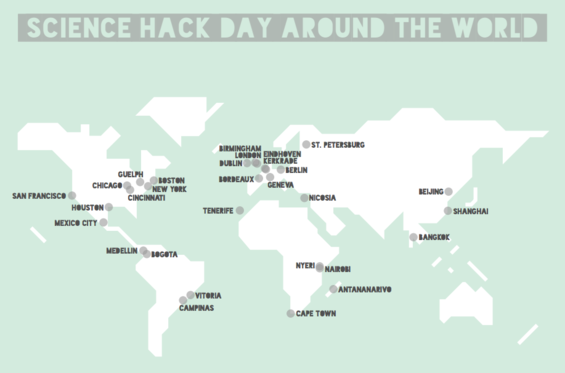Future Now
The IFTF Blog
Science Hack Day Celebrates 50th Global Event!
From Ariel Waldman, Global Director, Science Hack Day and 2013 IFTF Future for Good Fellow. Read the entire Science Hack Day 50 report >>

The relationship most people have with scientific exploration is one of observation: watching others explore on behalf of us, but not actually exploring it ourselves. For the last five years, an international grassroots network of people has been challenging this status quo with Science Hack Day: bringing together scientists, designers, developers and enthusiastic people from all backgrounds to get excited and make things with science. Today, thousands of people, hailing from 50 events in 19 countries around the world, have demonstrated that playing with science is the most empowering form of science engagement, whether or not you have a scientific background.
Organized by volunteers and supported by its gracious sponsors, Science Hack Day is entirely free to attend. By design, Science Hack Day is not an organization. It is what every attendee makes of it. It’s not a franchise; you do not need permission to organize your own. There is an open How-To Guide to help anyone wanting to create the event in their city. Everybody gets to own Science Hack Day collectively.
For some people the event has been obviously life-changing, inspiring career changes or sparking multi-year research endeavors. For many others, the impact is subtle yet powerful: the realization that they—as they exist right now with their unique experience, skill-set and way of looking at the world—can actively contribute to science in meaningful ways. This includes scientists playing in areas different than their own and realizing how unusual collaborations can enhance their work, career or general approach to science.
The science industry suffers immeasurably from not recognizing the potential of actively working with people from completely different disciplines. With a fresh set of eyes from those who solve problems across a wide range of industries, new concepts emerge and go on to influence scientific processes, communication and discoveries in unexpected letter from Ariel ways. Ivory towers can absolutely get by in continuing to stay tunnel-focused, but the forfeiture of countless clever approaches made by maintaining such a narrow path is reckless.
Building on what Jeremy Keith started with Science Hack Day London in 2010, I organized my first Science Hack Day that same year. Late at night, with the event in full swing around me, I whispered smilingly to my sleep-deprived self, “this is the best thing I’ve ever done”. Surrounded by so many smiles and so much enthusiasm, I witnessed a collective thrill for experimentation. It was an overwhelming high. At Science Hack Day, you’ll see countless clever solutions and playful experiments created over the course of a weekend. Its true achievement, however, is to elevate people and create impacts that last over lifetimes. I started leading the global effort for Science Hack Day because I believe in galvanizing the awesomeness within each individual – and building a world that harnesses their existing interests, skills, and backgrounds to create serendipitous and unexpected scientific discoveries.
I’m often asked what the best creation to come out of Science Hack Day has been and my enduring answer is: the people.
In gratitude to all the science hackers who have made these 50 events possible,
Ariel Waldman
Read more and learn how to get involved in the Science Hack Day 50 report >>
Ariel Waldman is an IFTF research affiliate and was a member of our 2013 class of Future for Good Fellows. Featured in Marina Gorbis' book, The Nature of the Future: Dispatches from the Socialstructed World, and honored by the White House as a Champion for Change in Citizen Science, Ariel is making the future of science and discovery fun and accessible for all.



